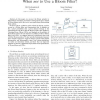Free Online Productivity Tools
i2Speak
i2Symbol
i2OCR
iTex2Img
iWeb2Print
iWeb2Shot
i2Type
iPdf2Split
iPdf2Merge
i2Bopomofo
i2Arabic
i2Style
i2Image
i2PDF
iLatex2Rtf
Sci2ools
INFOCOM
2012
IEEE
2012
IEEE
The Bloom paradox: When not to use a Bloom filter?
—In this paper, we uncover the Bloom paradox in Bloom filters: sometimes, it is better to disregard the query results of Bloom filters, and in fact not to even query them, thus making them useless. We first analyze conditions under which the Bloom paradox occurs in a Bloom filter, and demonstrate that it depends on the a priori probability that a given element belongs to the represented set. We show that the Bloom paradox also applies to Counting Bloom Filters (CBFs), and depends on the product of the hashed counters of each element. In addition, both for Bloom filters and CBFs, we suggest improved architectures that deal with the Bloom paradox. We also provide fundamental memory lower bounds required to support element queries with limited false-positive and false-negative rates. Last, using simulations, we verify our theoretical results, and show that our improved schemes can lead to a significant improvement in the performance of Bloom filters and CBFs.
| Added | 28 Sep 2012 |
| Updated | 28 Sep 2012 |
| Type | Journal |
| Year | 2012 |
| Where | INFOCOM |
| Authors | Ori Rottenstreich, Isaac Keslassy |
Comments (0)

